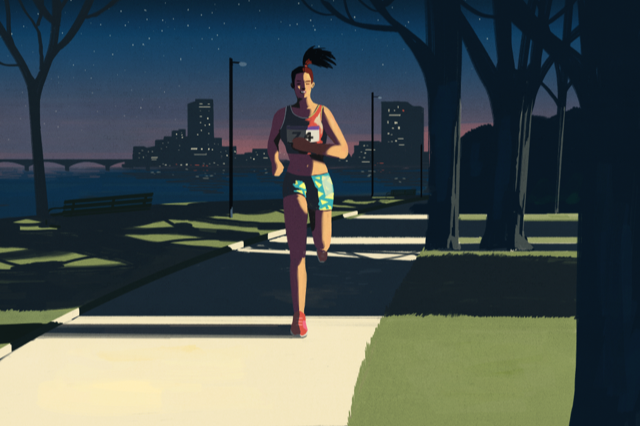
An important image to hold in your head: once, running, “racing” a man in Prospect Park in Brooklyn who did not know we were racing, I slipped onto the dirt path next to the road to get a little distance on him, and, because I was trying to see how close he was to passing me, I did not notice a root sticking up out of the ground and I tripped and fell and bloodied both elbows and both knees. I have been known to not be able to let small children pass me, should they sidle up beside me as I run. I’ve torn a quadricep twice, once in high school and again in college, trying to extend my legs in the final stretch of an 800-meter race. I love running, but for a long time I didn’t know this. I loved winning. Running was just the tool by which this was achieved.
My mother is a runner, winner of local age-group races, protector of that silent precious pre-dawn hour when no one talks and she has her body to herself. In high school, having run cross country, track, off-season hot Florida summer training, nearly every day since I was 13, I said to my father that I would never be a runner like my mother. Absurdly, I said, “If I’m not competing at a high level, what’s the point?” For a stretch of time in college, I stopped running, for lots of reasons really, but also because the prospect of not winning was so paralyzing, I couldn’t fathom running if it meant I might lose.
I was also then a depressed person; wasn’t sleeping, mostly wasn’t speaking, left my dorm room only late at night or early in the morning when I knew I wouldn’t have to interact with anyone. Eventually, seeing doctors, taking medications, getting better, I began to run again. I did this early in the mornings. It was Boston, and the shock of cold air in my lungs was the first gulp of something that wasn’t blank and flat, that didn’t taste and feel like mush that I had experienced in years. I ran in snow, on ice, along the Charles River, in fall and winter, spring and summer. I did not ever wear a watch.
There would be years still when running failed me, when I stopped because I couldn’t leave the house or I got injured, when an injury made me realize I had to scale back. It helped me to understand, though, that there was no clear and absolute better, no point at which, for instance, one might win enough to feel sure or safe. It became instead a practice, daily: this day, this run, and then, for now, OK. There is power in this. One of the worst things about depression is the lack of agency, the constant deadening sense that none of what you think or feel is within your control. There is something deeply satisfying about the power I feel running: I go out there almost every day and almost every day I feel better when I’m done.
We’ve moved seven times since March 2020. My husband got laid off. Bad landlords. Familial needs. Contingent work. Our kids stuck at home. The continued search for something secure and solid in a world that feels like neither of those things. Our whole lives felt jagged, slippery, but my shoes, two legs, two feet, one foot then the next did not. A new shade was added to this practice: how suddenly and sharply we all saw the vulnerability of our bodies. There was something pleasingly defiant, continuing to go out there, proving my body could be a source of strength.
I am now close to the age my mom was when I told my dad I had no interest in being like her. I won my age group at my most recent (regional) marathon and swiftly lost the medal in one of our kids’ rooms. I thought I’d stop running when I stopped winning because I thought then that the power that I felt came from the attention that I got, the medals and the honors, the thrill of being first. But what I’ve learned in these two decades is that there are much greater thrills than other people thinking that you’re good or fast; everybody, eventually, slows down. I run most often now when it’s still dark and hardly anybody sees me. I seldom race and often do not wear a watch. I have never felt as strong or powerful as I do now, having also birthed two babies, staring down that strange miasmic space of middle age, knowing that whatever my body has to offer in those early morning hours is something precious, private, something so much less mutable than whatever winning is.
More Must-Reads from TIME
- Introducing the 2024 TIME100 Next
- The Reinvention of J.D. Vance
- How to Survive Election Season Without Losing Your Mind
- Welcome to the Golden Age of Scams
- Did the Pandemic Break Our Brains?
- The Many Lives of Jack Antonoff
- 33 True Crime Documentaries That Shaped the Genre
- Why Gut Health Issues Are More Common in Women
Contact us at letters@time.com